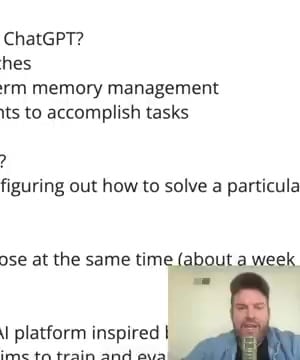How are AI agents trained and evaluated?
Sources:
Training and evaluating AI agents typically involve several key processes, focusing on tasks like reinforcement learning, cognitive development, and generalization. Here are some highlights from trusted experts on how these processes are implemented and evaluated:
-
General Training and Evaluation:
- Developers often create specific curricula to train their agents, sometimes using random arenas or bespoke environments to see how well the agent can perform in surprising or previously unseen tasks. An example is the AI Olympics, where agents were evaluated on different experimental paradigms and compared against biological intelligence, like that of children, who performed significantly better on the same tasks 1.
- Evaluations usually focus on how close an AI's policy aligns with an optimality criterion defined by the utility function. The aim is to uncover any latent capabilities or failure modes of agents through robust demonstration methods 2.
-
Specialized AI Training:
- Some systems, like Baby AGI, utilize reinforcement learning within a simulated environment to train agents to execute and prioritize tasks in a loop, allowing them to learn and adapt continuously based on task results 3.
- Projects such as SW agent solve specific tasks like fixing GitHub issues, which involve modeling changes over time to test the agent's adaptability and robustness in dynamic environments. This approach ensures evaluations consider evolving conditions 4.
-
Generalist AI Agents:
- DeepMind's work on generalist AI agents, trained in various real games and simulated environments, emphasizes the agent's ability to generalize tasks when given simple instructions, without accessing specific game APIs. These agents learn by cloning human performance, supplemented by reinforcement learning 5 6.
-
Benchmarks and Testing:
- Evaluating AI systems can be challenging due to the opacity of training data. Benchmarking often includes secretive test sets to prevent training data contamination, ensuring genuine assessment of an agent's generalization and problem-solving abilities 4.
- Modern benchmarks also include studying how well AI agents can infer patterns and solve complex tasks that likely aren't part of their training data, ensuring their generalization capabilities are genuinely impressive and not merely reflections of training data lookup 7.
Overall, AI agent training and evaluation are evolving to focus more on generalization, robustness, and adaptability through sophisticated methodologies and dynamic benchmark systems.
RELATED QUESTIONS-


